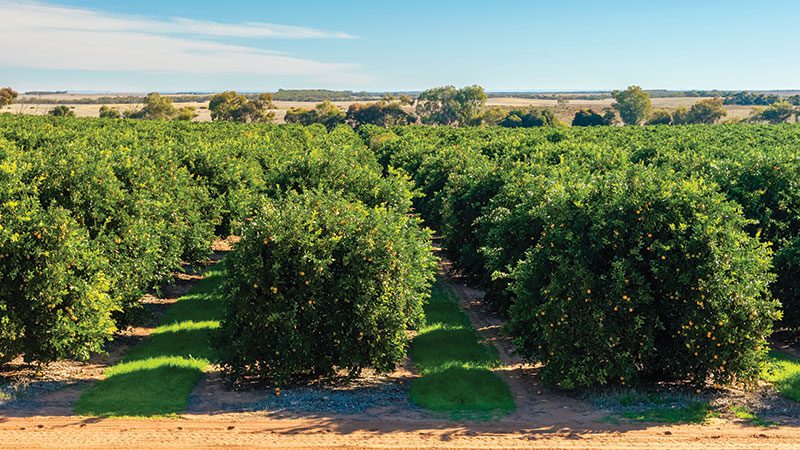News Bites
This article was originally published in November 2023

Georgia oranges?
Citrus is a new crop for Georgia, one that’s taking root thanks to the combined forces of climate change, crop science and disease in Florida. Although that citrus powerhouse is just to the south, historically it’s been just enough colder in Georgia to discourage farmers from growing citrus. But a new citrus industry in Georgia is growing rapidly. (Grist.org)
New salmon habitat
Western Washington’s salmon will have more water to explore after crews converted dilapidated buildings into a new estuary in Tukwila. The Department of Natural Resources and Parks (DNRP) transformed run-down buildings in Tukwila into nearly 6 acres of habitat for young salmon and greenspace for nearby communities. Known as Chinook Wind, the new estuary provides young salmon with the intertidal habitat they need. (msn.com)
Seattle vegetarians
Survey data from market-research giant Nielsen (is) showing the Seattle area is barely average for the share of the 18-and-older population that is vegetarian or vegan. Among the 50 largest metro areas, Seattle ranked 34th. Just 3.6% of adults in our area—that’s about 118,000 people—identified as vegetarian or vegan, according to the survey data. (SeattleTimes.com)
Edamame explosion
As consumers continue to reach for higher protein and healthier snacks, the edamame market is capitalizing on its rising popularity. In 2022, the global frozen edamame market size was $233 million, according to Global Information. It will reach $300 million in 2029. (FoodDive.com)
Potato problems
Othello (Wash.) produces more frozen french fries, hash browns and tater tots than anywhere else in the world—1.5 billion pounds a year, or 15% of North American production. But rapid investment has brought rapid growth, and now—like many places across the American West—Othello is running out of water. Unless local officials can come up with $400 million to pipe water from Columbia River canals to the north, the region’s wells could run dry in as few as five years. (WashingtonPost.com)
Feeding students
The hottest new restaurant in California might be your local elementary school. Thanks to a surge of nearly $15 billion in state and federal funding, school districts are ditching the old standbys—frozen pizza and chicken nuggets—in favor of organic salads, free-range grilled chicken, vegan chana masala, chilaquiles and other treats. The move to healthier, fresher school meals comes on the heels of California’s first-in-the-nation program providing free breakfast, lunch and snacks to nearly 6 million students in public schools, regardless of whether they qualify under federal income guidelines. (Calmatters.org)
Climate grocery costs
A leading discount supermarket in Germany has raised the prices of a selection of its products to reflect their real cost on people’s health and the environment. In a week-long experiment in all 2,150 branches of the Penny chain, a range of nine products, mainly dairy and meat, will be priced at what experts from two universities have deemed to be their true cost, in relation to their effect on soil, climate, water use and health. The awareness promotion week is taking place in conjunction with academics from the Nuremberg Institute of Technology and the University of Greifswald, and was triggered by the conviction among consumer researchers that price tags in supermarkets in no way reflect the true environmental or long-term health costs of producing the foodstuffs and getting them on to retailers’ shelves. (TheGuardian.com)
Habitat protections endangered
The U.S. Department of Agriculture (USDA) will end income-replacement payments to some Whatcom County farmers who voluntarily took land out of production to provide habitat for wildlife and fish. Over the past two decades, the USDA’s Farm Services Agency (FSA) has erroneously enrolled ineligible land in the Conservation Reserve Enhancement Program (CREP), FSA State Director Jon Wyss said. More than 200 CREP contracts in Whatcom County could be terminated or modified because of FSA errors dating back to 2003, he said. (CapitalPress.com)

Farmers market anniversary
August marked the 30th anniversary of a ubiquitous part of Seattle life: Neighborhood Farmers Markets. Chris Curtis founded the first market in 1993, with help from a small group of volunteers. They based the idea on a California model that put farmers first and spent a year and a half researching and working with the city before opening in the University District. (King5.com)
Seaweed farming
Now seen as a “future-proof” material, seaweed is a hardy, fast-growing protein source useful for everything from biofuel to petroleum-free plastic to consumer goods like utensils, soap, clothing, and of course, food. The World Bank said raising this versatile crop in just 5% of U.S. territorial waters would produce as much protein as 2.3 trillion hamburgers and sequester the carbon emissions of 20 million cars. Given all that, the market, which stood at $15 billion two years ago, is projected to hit $24.92 billion in 2028. (ModernFarmer.com)
Waste reduction
This year, the King County Solid Waste Division launched Re+, with an ambitious goal to reduce the amount of waste going to our regional landfill by 70% by 2030. The plan outlines actions to reduce waste at every point in the lifecycle of the products and items we use. In addition to reusing more, reducing single-use items, and expanding access and effectiveness of our recycling and composting programs, the County is investigating a new technology, called mixed waste processing, that can capture and divert valuable resources from the stuff that does end up in the garbage bin. (KingCountyGreen.com)
PFAS settlement
3M (earlier this year) secured preliminary approval for a $10.3 billion deal resolving claims by U.S. public water providers that the company polluted drinking water with toxic chemicals, less than a day after a group of 22 U.S. states and territories dropped their objections to the deal. U.S. District Judge Richard Gergel in Charleston, South Carolina, said in a court filing that the settlement of hundreds of lawsuits against the Minnesota-based company over pollution by perfluoroalkyl and polyfluoroalkyl substances, or PFAS, is “sufficiently fair, reasonable and adequate” to justify moving forward. The settlement will be considered during a final “fairness hearing” in February, when the judge will consider any outstanding objections or concerns before deciding whether to give final approval. (msn.com)
Cadmium levels lawsuit
The Environmental Protection Agency (EPA) is failing to protect endangered species such as sea turtles and sturgeon by allowing sharp increases in levels of toxic cadmium in U.S. waters, a federal judge has ruled. The court decision, handed down Aug. 18 in the U.S. District Court for the District of Arizona, sided with the environmental group the Center for Biological Diversity, which argued in a 2022 lawsuit that the EPA violated the Endangered Species Act (ESA) when it failed to determine whether allowing a 188% increase in chronic freshwater exposure to the heavy metal would harm already endangered aquatic animals and organisms. Acute cadmium exposure has been found to cause increased mortality in certain organisms, while chronic exposure has been shown to impact growth, reproduction, immune and endocrine systems, development and behavior of wildlife. (TheNewLede.org)
Local food initiative
King County is updating its Local Food Initiative (LFI), nearly a decade after it was founded to expand the local food economy, benefit business and farms, and improve access to health and affordable food in low-income communities. The policy roadmap has led to county investments over the past decade, including preservation of farmland to be leased to underrepresented producers, expansion of farmland planning in the Snoqualmie Valley, and development of the South Seattle Food Hub. A new King County Food Systems Advisory Council is being convened to guide both the development and implementation of the new LFI and the complementary Regional Food System Program; the new plan is expected by the end of 2024. (KingCountyGreen.com)
Meaty research
New research indicates that not all beef eaters are created equal. A small percentage of the country’s population—just 12%—accounts for half of the country’s beef consumption on any given day, according to a paper published (recently) in the journal Nutrients. From a climate standpoint, these beef guzzlers are not all that different from gasoline superusers—the 10% of drivers who account for one-third of the country’s gas use. A single cow can belch up to 264 pounds of methane in a year, the equivalent of burning almost 4,000 pounds of coal or driving a gas-powered car about 9,000 miles. (Grist.org)
Wellness icon dies
Patricia Bragg, health and wellness icon and CEO of the Bragg food company, died at age 94 in her Goleta home Aug. 10, according to her company’s Instagram page. “Patricia was a true visionary who transformed the lives of millions through her work in health & wellness education and nearly five decades as our company’s CEO,” wrote the Instagram post. Bragg is well known for its Apple Cider Vinegar product, as well as salad dressings and more. (keyt.com)
